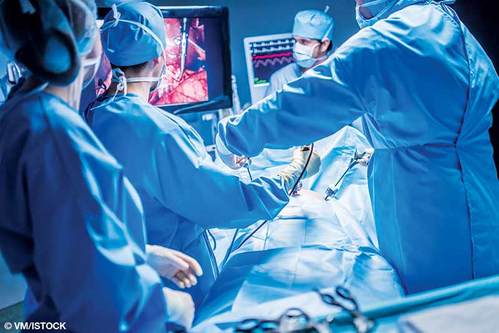Hiatal Hernia

I recently had a hiatal hernia repaired with laparoscopic surgery, during which the surgeon used CO2 to inflate my abdominal cavity. One of the side effects is shoulder pain on my left side, which my doctor said was due to the CO2 permeating the tissue. Pain medicine has not been working, so my doctor suggested walking to get rid of the excess gas. Since this seems similar to decompression sickness (DCS), should I be concerned about future dive trips?
During laparoscopic surgery, surgeons insert tubes with lighted cameras and surgical instruments to repair the hernia with minimal intervention. To expand their view, surgeons often use gas to create a space called a pneumoperitoneum. CO2 is the preferred gas in laparoscopic surgery due to its high solubility in the blood and its resistance to combustion, which is particularly important with the presence of electrosurgical equipment. Another benefit is that you can rapidly clear CO2 from your body as a natural byproduct of respiration.
Shoulder pain is a common side effect of a pneumoperitoneum. The phrenic nerve originates from the same level of the cervical spine (neck) as the nerves that provide sensation to the shoulders and descends downward between the lungs to the diaphragm. The diaphragm and shoulder thus share the same nerve path. Trapped CO2 can irritate the phrenic nerve and cause shoulder pain, and movement may help release the gas. Residual effects of a pneumoperitoneum and CO2 retention resolve within seven days in 96 percent of the patients who undergo this procedure.
The pathophysiology of referred pain from laparoscopic procedures is quite different from the way DCS may cause shoulder pain while scuba diving. Many factors can lead to DCS, including overall fitness to dive, general health, hydration status and thermal status. While you may or may not be at a greater risk for DCS after surgery, it is prudent to refrain from diving until you have completely healed and your surgeon has released you for unrestricted, rigorous activity.
Remember that there is always some degree of DCS risk any time you dive, so take measures to minimize that risk. Continuously monitor yourself for signs and symptoms of DCS following a dive, and seek medical attention at the nearest appropriate facility if symptoms develop.
— Robert Soncini, NR-P, DMT
During laparoscopic surgery, surgeons insert tubes with lighted cameras and surgical instruments to repair the hernia with minimal intervention. To expand their view, surgeons often use gas to create a space called a pneumoperitoneum. CO2 is the preferred gas in laparoscopic surgery due to its high solubility in the blood and its resistance to combustion, which is particularly important with the presence of electrosurgical equipment. Another benefit is that you can rapidly clear CO2 from your body as a natural byproduct of respiration.
Shoulder pain is a common side effect of a pneumoperitoneum. The phrenic nerve originates from the same level of the cervical spine (neck) as the nerves that provide sensation to the shoulders and descends downward between the lungs to the diaphragm. The diaphragm and shoulder thus share the same nerve path. Trapped CO2 can irritate the phrenic nerve and cause shoulder pain, and movement may help release the gas. Residual effects of a pneumoperitoneum and CO2 retention resolve within seven days in 96 percent of the patients who undergo this procedure.
The pathophysiology of referred pain from laparoscopic procedures is quite different from the way DCS may cause shoulder pain while scuba diving. Many factors can lead to DCS, including overall fitness to dive, general health, hydration status and thermal status. While you may or may not be at a greater risk for DCS after surgery, it is prudent to refrain from diving until you have completely healed and your surgeon has released you for unrestricted, rigorous activity.
Remember that there is always some degree of DCS risk any time you dive, so take measures to minimize that risk. Continuously monitor yourself for signs and symptoms of DCS following a dive, and seek medical attention at the nearest appropriate facility if symptoms develop.
— Robert Soncini, NR-P, DMT
Categories
2025
2024
February
March
April
May
October
My name is Rosanne… DAN was there for me?My name is Pam… DAN was there for me?My name is Nadia… DAN was there for me?My name is Morgan… DAN was there for me?My name is Mark… DAN was there for me?My name is Julika… DAN was there for me?My name is James Lewis… DAN was there for me?My name is Jack… DAN was there for me?My name is Mrs. Du Toit… DAN was there for me?My name is Sean… DAN was there for me?My name is Clayton… DAN was there for me?My name is Claire… DAN was there for me?My name is Lauren… DAN was there for me?My name is Amos… DAN was there for me?My name is Kelly… DAN was there for me?Get to Know DAN Instructor: Mauro JijeGet to know DAN Instructor: Sinda da GraçaGet to know DAN Instructor: JP BarnardGet to know DAN instructor: Gregory DriesselGet to know DAN instructor Trainer: Christo van JaarsveldGet to Know DAN Instructor: Beto Vambiane
November
Get to know DAN Instructor: Dylan BowlesGet to know DAN instructor: Ryan CapazorioGet to know DAN Instructor: Tyrone LubbeGet to know DAN Instructor: Caitlyn MonahanScience Saves SharksSafety AngelsDiving Anilao with Adam SokolskiUnderstanding Dive Equipment RegulationsDiving With A PFOUnderwater NavigationFinding My PassionDiving Deep with DSLRDebunking Freediving MythsImmersion Pulmonary OedemaSwimmer's EarMEMBER PROFILE: RAY DALIOAdventure Auntie: Yvette OosthuizenClean Our OceansWhat to Look for in a Dive Boat
2023
January
March
Terrific Freedive ModeKaboom!....The Big Oxygen Safety IssueScuba Nudi ClothingThe Benefits of Being BaldDive into Freedive InstructionCape Marine Research and Diver DevelopmentThe Inhaca Ocean Alliance.“LIGHTS, Film, Action!”Demo DiversSpecial Forces DiverWhat Dive Computers Don\'t Know | PART 2Toughing It Out Is Dangerous
April
